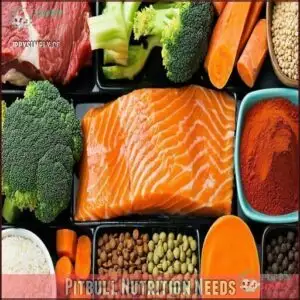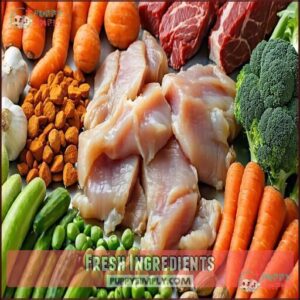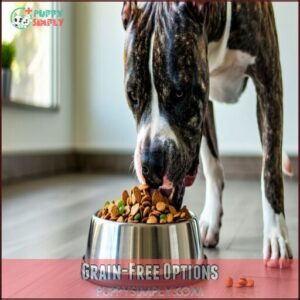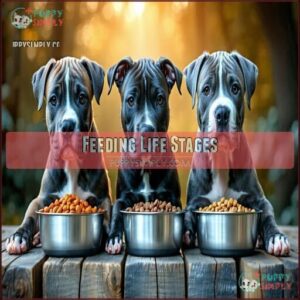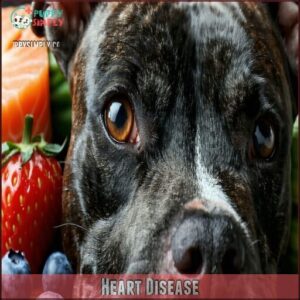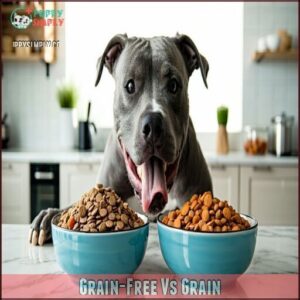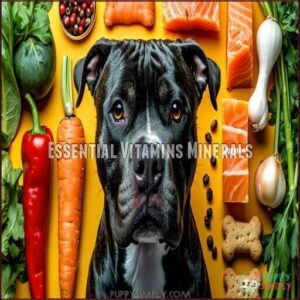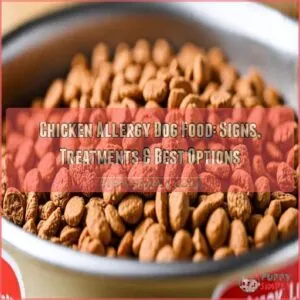This site is supported by our readers. We may earn a commission, at no cost to you, if you purchase through links.
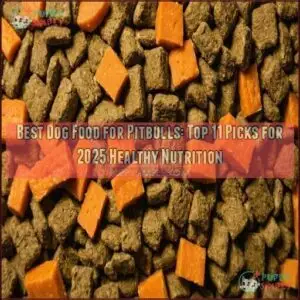 Your pitbull needs protein-rich food to maintain those impressive muscles. Look for options with real meat as the first ingredient—chicken, beef, or fish work well.
Your pitbull needs protein-rich food to maintain those impressive muscles. Look for options with real meat as the first ingredient—chicken, beef, or fish work well.
You’ll want to provide 25-30% protein content for adult pitbulls, slightly higher for puppies. Quality brands like Blue Buffalo Wilderness, Orijen, and Purina Pro Plan offer excellent nutritional profiles suited to active breeds.
Avoid foods with excessive fillers or artificial additives that can trigger allergies, as pitties often have sensitive skin. Consider your dog’s age, activity level, and any health concerns when making your final choice.
The right balance of protein, fats, and limited carbs can transform your pup’s energy levels and coat shine.
Table Of Contents
- Key Takeaways
- Pitbull Nutrition Needs
- Health Considerations
- Choosing Dog Food
- Top 11 Best Foods
- 1. Orijen Original Grain Free Dog Food
- 2. JustFoodForDogs Wet Dog Food Variety Pack
- 3. Blue Buffalo Wilderness Turkey Chicken Dog Food
- 4. Hill’s Science Diet Sensitive Stomach Skin Dog Food
- 5. Natural Balance Lamb Brown Rice Dog Food
- 6. Purina One Chicken Dog Food
- 7. Blue Buffalo Wet Dog Food
- 8. Natural Senior Dog Food Chicken
- 9. Grain Free High Protein Dog Food
- 10. Blue Buffalo Adult Dog Food
- 11. Chicken and Oatmeal Dog Food
- Feeding Life Stages
- Special Dietary Needs
- Grain-Free Vs Grain
- Essential Vitamins Minerals
- Selecting Right Food
- Frequently Asked Questions (FAQs)
- What dog food is best for pit bulls?
- Is Purina Pro Plan good for pitbulls?
- What should pit bulls not eat?
- What is the best dog food for a pit bull?
- What are the best dog food brands for Pitbulls?
- Is Sundays food for dogs good for pit bulls?
- What should a pit bull eat?
- What is the best wet dog food for Pitbulls?
- What should I Feed my Pitbull if he is not eating well?
- Can pit bulls eat homemade dog food?
- Conclusion
Key Takeaways
- Your pitbull needs high-protein food (25-30% for adults) with real meat as the first ingredient to maintain their impressive muscles and energy levels.
- Choose foods with limited fillers and no artificial additives, as pitbulls often have sensitive skin and are prone to allergies, particularly to ingredients like wheat, soy, and corn.
- Consider your dog’s life stage when selecting food—puppies need more frequent meals and higher protein, adults need balanced nutrition, and seniors benefit from joint-supporting ingredients like glucosamine.
- Quality brands like Blue Buffalo Wilderness, Orijen, and Purina Pro Plan offer excellent nutritional profiles, but you should consult your veterinarian for personalized recommendations based on your pitbull’s specific health needs.
Pitbull Nutrition Needs
Your Pitbull’s nutrition needs are as unique as their personality, requiring a careful balance of protein, fats, and carbohydrates to fuel their energy and muscle growth.
Understanding these needs helps you choose foods that promote their health, while avoiding common allergens that could cause discomfort, which is crucial for their overall health.
Protein Requirements
Protein is the cornerstone of pitbull nutrition, ensuring muscle growth, energy, and vitality.
Focus on high-protein pitbull food with quality ingredients for better digestion.
Look for:
- Protein sources like chicken, beef, or fish.
- AAFCO-certified food for balanced puppy and senior protein needs.
- 20-27% protein for active dogs.
- Easily digestible protein for maximum muscle support.
Calorie Intake
Calorie content matters in your pitbull’s diet.
Puppies need around 50-70 calories per pound, fueling growth and energy.
Adults? Their intake depends on activity levels—30-40 calories per pound for active ones or 20-30 for the laid-back.
Portion control balances weight management. Tailoring daily requirements guarantees the best pitbull nutrition, so consult your vet for personalized pitbull food advice, ensuring the right nutrition for your pet.
Avoiding Common Allergens
Allergies can leave your pitbull itchy, uncomfortable, and miserable.
Avoid triggers with smart food choices. Look for:
- Novel Proteins like duck or venison.
- Limited Ingredients for food sensitivities.
- Allergy testing to pinpoint issues.
- Dog food for allergies to address skin irritations.
- Omega-3s for itch relief.
Skin allergies call for a customized, balanced diet. Consider hydrolyzed protein options for sensitive pups.
Health Considerations
When choosing food for your pitbull, you need to take into account its unique health challenges, like hip dysplasia, skin irritations, and immune system needs.
A proper diet supports muscle and joint health, reduces allergy flare-ups, and boosts overall well-being.
Hip Dysplasia
Pitbulls are genetically predisposed to hip dysplasia, a condition affecting joint health and mobility.
Supporting puppy growth with proper weight management, joint supplements like glucosamine and chondroitin sulfate, and low-impact exercise can reduce strain on their hips.
Foods rich in omega-3s, proteins, and calcium are ideal for strengthening cartilage.
A healthy diet safeguards pitbull health by minimizing exercise impact on joints, and in severe cases, owners may face difficult decisions regarding end stage hip dysplasia.
Skin Irritations
Skin health is key with pitbulls, especially due to their sensitivity to allergens and food sensitivities.
Combat skin itching and manage pitbull allergies with smart strategies:
- Allergen Identification: Spot triggers like grains or artificial additives.
- Omega Supplements: Support skin health and reduce inflammation.
- Bathing Frequency: Avoid overwashing to prevent dryness.
- Topical Treatments: Treat redness or secondary infections effectively.
Immune Function
A strong immune system keeps your pitbull ready for life’s challenges.
Boost it with antioxidant support from fruits, omega fatty acids for cell health, and probiotics to enhance gut health.
These elements manage allergies while fighting germs, and supplementation options, like fish oil or specific probiotic blends, make it easy to optimize immunity. Healthy food fuels resilience!
Choosing Dog Food
When choosing the best food for your Pitbull, focus on their specific nutritional needs, like high-quality protein and balanced fats.
Carefully consider their age, activity level, and any health concerns to guarantee they stay fueled and healthy.
High-Protein Options
Muscle-building starts with high-quality protein sources.
For pitbull muscle growth, aim for 22-32% protein in their food. Brands like Orijen and Bully Max pair protein with nutrients to boost energy levels and support activity needs.
Look for supplementation options with omega fatty acids. Consider bioavailability of protein when selecting kibble.
The best high-protein pitbull food keeps them strong, active, and ready for anything – no wasted days.
Fresh Ingredients
When choosing dog food, real meat and whole vegetables are your best bet.
Fresh food with humangrade ingredients, minimal processing, and nutrient retention keeps your pitbull energized. Think human-grade meals with chicken or beef and vegetables like carrots or peas.
Some owners are now choosing foods with better ingredients. It’s like offering them a chef’s special every day—healthy, tasty, and packed with everything they need!
Grain-Free Options
Your pitbull deserves grainfree options, especially if allergies or DCM concerns are on your radar.
Grain-free pitbull food prioritizes digestibility and high-quality ingredient sourcing for sensitive tummies. Consider grain-free food options for superior health.
Notable pitbull food brands include:
- Taste of the Wild: Real meat with allergy alternatives.
- Orijen Grain-Free: High protein and trusted in pitbull food reviews.
- Blue Buffalo Wilderness: Balanced, affordable, and widely loved!
Top 11 Best Foods
Finding the right food for your Pitbull can feel overwhelming, but it’s essential to meet their unique nutritional needs.
Here are the top 11 scientifically-backed options to keep your dog healthy, active, and full of energy.
1. Orijen Original Grain Free Dog Food
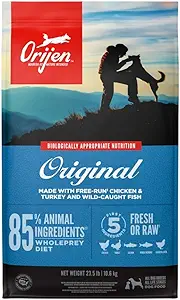
Orijen Original Grain Free Dog Food is like nature in a bowl for your Pitbull—packed with 85% animal ingredients, including chicken, turkey, and salmon.
Its WholePrey formula provides muscle-building protein, essential vitamins, and Omega fatty acids for shiny coats and strong immune systems.
With no grains, it’s perfect for allergy-prone dogs, while prebiotics support digestion.
The freeze-dried liver adds irresistible flavor, making picky eaters happy.
Though premium-priced, its high-quality, regionally sourced ingredients guarantee worth every penny for active, thriving dogs.
Best For: Active dogs or those with grain allergies, providing high-quality, nutrient-rich food for optimal health.
- High protein content with 85% animal ingredients for muscle support.
- Grain-free formula ideal for dogs with allergies or sensitivities.
- Includes Omega fatty acids and prebiotics for coat and digestion health.
- Premium pricing may not fit all budgets.
- Large bag size requires adequate storage space.
- Not suitable for those preferring a purely raw diet.
2. JustFoodForDogs Wet Dog Food Variety Pack
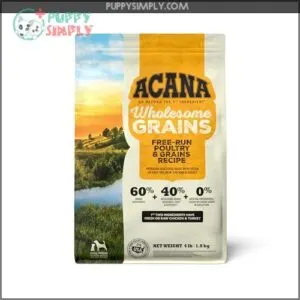
Looking for fresh, human-grade dog food? The JustFoodForDogs Wet Dog Food Variety Pack is a game-changer.
Each recipe uses gently cooked, real ingredients like beef, russet potatoes, and greens, making it perfect for picky eaters or dogs with sensitivities.
It’s a breeze to serve and supports healthy growth and aging. With its sampler pack of seven recipes, you can easily rotate flavors to keep mealtime exciting.
Packed with nutrients, this option guarantees balanced nutrition for Pitbulls, whether used alone or as a topper.
Best For: Pet owners seeking fresh, human-grade, nutrient-packed dog food with variety for picky eaters or dogs with sensitivities.
- Made with 100% human-grade ingredients.
- Supports healthy growth and aging.
- Variety pack offers rotational feeding options.
- More expensive than standard kibble.
- Requires refrigeration for fresh-frozen recipes.
- Not ideal for long-term storage due to perishability.
3. Blue Buffalo Wilderness Turkey Chicken Dog Food
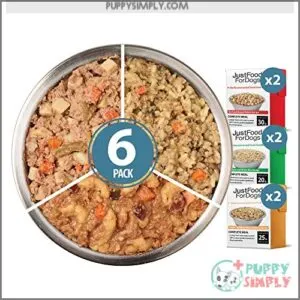
Blue Buffalo Wilderness Turkey & Chicken Dog Food stands out with a hearty, protein-rich formula designed to fuel your dog’s active lifestyle.
Its grain-free recipe, featuring real turkey and chicken, satisfies cravings while supporting muscle growth and energy.
Packed with essential vitamins, minerals, and antioxidants, it promotes overall health, including a shiny coat and strong immune system.
Free from artificial additives, this food caters to dogs with sensitive stomachs, and if your pup has a carnivorous side, this meal might be their new favorite, making it a great option for a healthy lifestyle.
Best For: Active dogs with a carnivorous appetite or dietary sensitivities looking for a grain-free, protein-rich meal.
- High in protein with turkey and chicken as primary ingredients.
- Grain-free formula ideal for sensitive stomachs.
- Packed with vitamins, minerals, and antioxidants for overall health.
- Higher cost compared to standard dog food.
- Limited to turkey and chicken flavors.
- May not be suitable for dogs preferring a different texture.
4. Hill’s Science Diet Sensitive Stomach Skin Dog Food
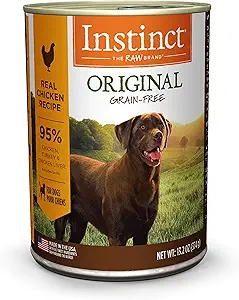
If your dog’s tummy isn’t cooperating, Hill’s Science Diet Sensitive Stomach Skin Dog Food might save the day.
This formula boasts highly digestible ingredients, designed to be gentle on sensitive stomachs while improving nutrient absorption.
Packed with vitamin E and omega-6 fatty acids, it supports a shiny coat and healthy skin.
It’s crafted without artificial additives and enhanced with natural ingredients, vitamins, and minerals, making it a scientifically balanced blend.
Perfect for Pitbulls needing extra care, this formula guarantees happier mealtimes—without the bellyaches.
Best For: Dogs with sensitive stomachs and skin needing a gentle, nutrient-rich diet.
- Highly digestible formula for easy nutrient absorption.
- Includes vitamin E and omega-6 fatty acids for coat and skin health.
- Free of artificial additives, crafted with natural ingredients.
- Higher price point compared to budget options.
- Designed specifically for sensitive needs, not all dogs may benefit fully.
- Limited flavor options available.
5. Natural Balance Lamb Brown Rice Dog Food
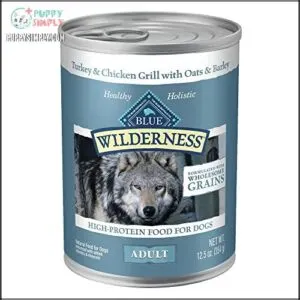
Natural Balance Lamb Brown Rice Dog Food is a solid choice for Pitbull owners looking for digestive and full-body health.
With lamb as the first ingredient, it delivers high-quality protein to support muscle development.
The inclusion of brown rice guarantees fiber for healthy digestion.
Free of chicken by-product meals, corn, wheat, and soy, it’s ideal for sensitive pups.
While some cans were reported defective, it’s still a reliable option for balanced nutrition.
Refrigerate unused portions, and your pup’s mealtime stays fresh, ensuring a reliable food source.
Best For: Pitbull owners or dogs with digestive sensitivities who need balanced nutrition.
- Lamb as the first ingredient for high-quality protein.
- Includes brown rice for digestive health.
- Free from common allergens like chicken by-products, corn, wheat, and soy.
- Reports of defective cans with unpleasant smell.
- Mixed reviews on picky dogs’ taste preferences.
- Requires refrigeration of unused portions.
6. Purina One Chicken Dog Food
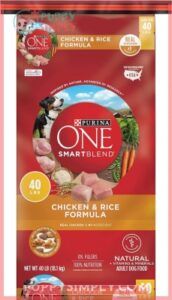
Purina One Chicken Dog Food delivers balanced, affordable nutrition for your pitbull.
With real chicken as the first ingredient, it supports strong muscles and promotes a healthy heart.
Its blend of crunchy kibble and tender morsels makes mealtime exciting while omega-6 fatty acids enhance skin and coat health.
Natural prebiotic fiber aids digestion, and glucosamine supports joint health—perfect for active pitbulls.
Plus, it meets AAFCO guidelines, so you’re assured of quality.
It’s a practical, tasty choice dogs adore, making it a great option with real chicken as a key ingredient.
Best For: Adult dogs, including active breeds like pitbulls, needing balanced nutrition with high-quality ingredients.
- Real chicken as the first ingredient supports muscle and heart health.
- Natural glucosamine sources aid joint health for active dogs.
- Omega-6 fatty acids enhance skin and coat health.
- Contains chicken, which may not suit dogs with allergies.
- Higher price compared to some other brands.
- Not specifically tailored for puppies or senior dogs.
7. Blue Buffalo Wet Dog Food
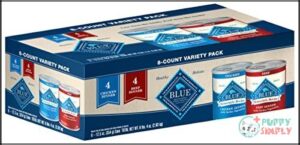
You’ll love Blue Buffalo Wet Dog Food for its real-meat recipes and balanced nutrition.
Packed with natural ingredients, plus added vitamins, it supports energy, digestion, and healthy skin.
The chicken and beef flavors often win over picky pit bulls, though some dogs experience mild digestive issues with the beef option.
Free from by-products, corn, or soy, it’s ideal for sensitive stomachs.
Owners appreciate its wholesome appeal, but watch for dented cans.
This quality choice proves nutritious meals don’t have to sacrifice taste.
Best For: Dogs with sensitive stomachs or picky eaters who enjoy real-meat flavors.
- Made with high-quality natural ingredients and added vitamins.
- Free from by-products, corn, wheat, soy, and artificial additives.
- Supports energy, digestion, and healthy skin.
- Some dogs may have mild digestive issues with the beef flavor.
- Occasional delivery of dented cans raises quality concerns.
- Price increases and stock shortages may be frustrating for some owners.
8. Natural Senior Dog Food Chicken
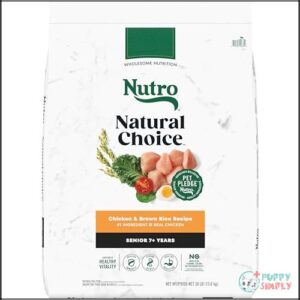
Looking for nutritional excellence for your senior pitbull? Nutro Natural Choice Senior Dry Dog Food with real chicken delivers exceptional joint support through its glucosamine and chondroitin formula.
Your aging companion will benefit from the balanced 20-26% protein content that maintains muscle mass without overworking their kidneys. The non-GMO ingredients exclude common allergens like corn and wheat, making it ideal for sensitive stomachs.
With omega-rich fats supporting skin health and a kibble texture designed to reduce plaque, you’re providing thorough care in every bowl. It’s packaged in a convenient 30 lb. bag for long-term feeding, offering exceptional joint support and a balanced diet.
Best For: Senior dogs, especially those with joint issues, sensitive stomachs, or needing balanced nutrition.
- High-quality protein supports muscle maintenance without overworking kidneys.
- Glucosamine and chondroitin promote joint health in aging dogs.
- Non-GMO recipe with no corn, wheat, or soy for sensitive stomachs.
- Higher price compared to other brands.
- May contain trace allergens from cross-contact during manufacturing.
- Requires gradual diet transition to avoid digestive upset.
9. Grain Free High Protein Dog Food
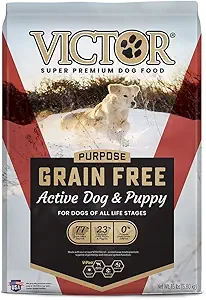
Strength meets nutrition in this grain-free, high-protein formula designed specifically for active pitbulls.
With 33% protein primarily sourced from premium beef and fish meals, this USA-made option supports your dog’s muscular build and energy needs.
The proprietary VPRO Blend enhances immune function while promoting digestive health and a lustrous coat.
Perfect for all life stages including puppies and pregnant females, it’s packed with essential vitamins and minerals without artificial additives.
Many owners report improved skin condition, reduced dandruff, and increased energy levels—making it ideal for pitbulls with grain sensitivities or high activity requirements.
Best For: Active Pitbulls of all life stages, including puppies and pregnant females, requiring high-protein, grain-free diets to support muscle, energy, and overall health.
- High protein (33%) from premium beef and fish meals supports muscle growth and energy.
- Grain-free formula alleviates sensitivities and promotes digestion in active breeds.
- Contains omega fatty acids and VPRO Blend for enhanced coat and immune health.
- Limited to a 15-pound bag size, which may require frequent repurchasing for larger dogs.
- Higher calorie content may not be suitable for less active Pitbulls prone to weight gain.
- May not meet the needs of dogs with specific protein sensitivities beyond beef or fish.
10. Blue Buffalo Adult Dog Food
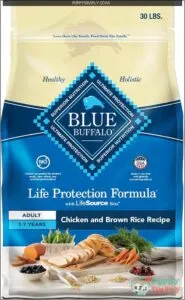
Blue Buffalo Adult Dog Food stands as a reliable choice for your pitbull’s nutrition needs.
With real lamb or chicken as the primary protein source, it helps build and maintain your dog’s strong muscles.
The formula includes wholesome whole grains, healthy fruits, and vegetables that provide essential nutrients.
Its exclusive LifeSource Bits contain antioxidant-rich ingredients supporting immune system health.
Available in sizes from 4 to 36 pounds, you can select what works best for your household.
Just be aware that some customers report quality differences between store-purchased and online-ordered bags, which may affect the overall nutrition needs and require careful consideration of the primary protein source and the presence of antioxidant-rich ingredients to support your dog’s immune system health.
Best For: Owners of adult pitbulls seeking natural, high-protein dog food with added immune system support.
- Reported differences in quality between store-purchased and online-ordered bags.
- Concerns about potential bad batches or counterfeit products from Amazon.
- Not suitable for dogs with chicken or lamb allergies.
- Real lamb or chicken as the primary protein source to support muscle health.
- Includes wholesome whole grains, fruits, and vegetables for balanced nutrition.
- Fortified with antioxidant-rich LifeSource Bits to boost immune function.
11. Chicken and Oatmeal Dog Food
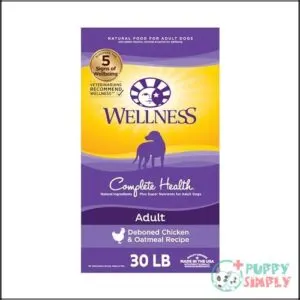
With a perfect balance of protein and fiber, this chicken and oatmeal formula provides excellent nutrition for your pitbull.
At 48.33% protein and 15.44% fat, it delivers 533 calories per two cups—ideal for maintaining muscle mass while supporting digestion.
You’ll appreciate that it’s developed by veterinarians and nutritional experts specifically for dogs with sensitive stomachs or gluten intolerance.
The high-quality protein sources promote lean muscle development, while the oatmeal offers digestible carbohydrates that won’t trigger allergies.
It’s a science-backed choice that combines nutritional excellence with palatability your pitbull will enthusiastically devour.
Best For: Pitbulls needing a high-protein, easily digestible diet to support muscle development and sensitive stomachs.
- High-protein formula promotes lean muscle mass.
- Oatmeal provides digestible carbohydrates for energy and gut health.
- Developed by veterinarians and nutritional experts.
- May not be suitable for dogs without high energy needs.
- Contains grains, which might not work for dogs with grain allergies.
- Higher calorie content may require portion adjustments for less active dogs.
Feeding Life Stages
You’ll need to adjust your pitbull’s diet throughout their life stages, from protein-rich puppy formulas supporting rapid growth to senior blends addressing aging joints and metabolism changes.
As your muscular companion progresses from boundless puppy to dignified senior, their nutritional requirements will evolve substantially, requiring thoughtful adaptation of both ingredients and portion sizes.
Their nutritional needs will change, and it is crucial to address these changes to support their health, particularly as they experience metabolism changes.
Feeding Pitbull Puppies
When should you feed your pitbull puppy? Puppies need three to four daily meals with proper portion sizes to support their rapid development.
Start with 1/2 to 1 cup per meal for 8-12 week old puppies, gradually increasing as they grow. Make certain their kibble contains adequate calcium levels for bone development.
For healthy health, consider homemade food benefits. By 6 months, you can reduce to twice-daily feedings while monitoring their growth stages.
Feeding Adult Pitbulls
Now that your pitbull has reached adulthood, portion control becomes your best ally.
Adult pitbulls need 800-1800 calories daily, depending on exercise needs. Your high-protein pitbull food should contain 22-32% protein from quality meat sources.
Split feeding into twice daily meals to prevent bloat. Remember, adequate hydration tips the scale toward good dental health.
Consider quality pitbull food for ideal health. Supplementation isn’t always necessary with complete dog food for adult pitbulls.
Feeding Senior Pitbulls
Three key changes occur as your senior pitbull enters their golden years, requiring dietary adjustments.
Focus on foods with glucosamine and chondroitin sulfate for joint support, while managing weight to prevent strain on aging bones.
Senior dogs need highly digestible nutrition with moderate calories.
- Your loyal companion deserves comfort in their sunset years
- Their muzzle may gray, but their spirit remains young
- Each meal becomes more precious as cognitive decline becomes a concern
- Their eyes still light up at mealtime, despite dental health challenges
Special Dietary Needs
Your pitbull’s health may require specialized nutrition beyond standard formulas, particularly if they’ve shown signs of food allergies or heart conditions.
You’ll need to select foods with limited ingredients for allergic dogs or heart-healthy formulations with appropriate levels of taurine and omega-3 fatty acids for cardiac support.
Food Allergies
Just as your pitbull’s nutritional needs change with age, their body can sometimes develop sensitivities to certain ingredients.
Many pitbulls struggle with food allergies that manifest as itchy skin, red eyes, or hair loss.
| Common Allergens | Recommended Action | Helpful Solutions |
|---|---|---|
| Wheat, Soy, Corn | Try limited-ingredient diets | Natural Balance L.I.D. |
| Beef, Chicken, Pork | Explore novel proteins | Duck, Venison, Salmon |
| Artificial additives | Choose hypoallergenic options | Elimination diet |
The table provides a summary of common allergens, recommended actions, and helpful solutions to address these issues in pitbulls.
Heart Disease
While addressing food sensitivities, don’t overlook your pitbull’s heart health.
Pit bull-type breeds commonly face congestive heart failure and DCM risk.
When selecting food, look for options with low sodium levels and added fish oil.
L-carnitine support and adequate taurine can help combat taurine deficiency linked to cardiac disease.
Grain-free concerns persist due to potential DCM connections, so consult your veterinarian before choosing grain-free diets for pitbulls with heart conditions.
Grain-Free Vs Grain
You’ll need to understand the grain-free vs. grain debate to make an informed choice for your pitbull, as recent studies link some grain-free diets to heart problems in dogs.
Whole grains can actually provide essential nutrients and fiber for your pitbull’s digestive health, contrary to common marketing claims that suggest all grains are harmful allergens, which is a key point to consider in the grain-free debate.
Benefits of Grain-Free
While managing food allergies in pitbulls requires specialized nutrition, you might wonder about grain-free options.
Many owners report significant benefits when switching to grain-free pitbull food.
| Benefit | How It Helps | Notable Result |
|---|---|---|
| Allergy Reduction | Eliminates common triggers | Fewer skin flare-ups |
| Improved Digestion | Easier to process | Less gas and bloating |
| Shinier Coat | Better nutrient absorption | Healthier appearance |
| Increased Energy | Higher protein content | More active playtime |
Grain-free diets can help with Weight Management too, as they’re often lower in carbohydrates, which can lead to better nutrient absorption and a healthier appearance.
Risks of Grain-Free
While grain-free options might seem trendy, they carry significant risks for your pitbull.
The FDA has linked grain-free diets to dilated cardiomyopathy (DCM), a serious heart condition that can be fatal.
| Risk Factor | Impact | Concern Level |
|---|---|---|
| DCM Link | Heart failure potential | High |
| Nutritional Deficiencies | Lack of essential taurine | Moderate |
| DCM-linked ingredients | Legumes replace fiber sources | High |
Don’t gamble with your pup’s health—grain-free diets lack nutritional basis unless your dog has confirmed grain allergies. They are associated with a high risk of health problems, making it crucial to consider the potential consequences.
Importance of Whole Grains
Despite the grain-free trend, whole grains offer significant benefits for your pitbull’s overall health.
They’re not just fillers—they provide essential nutrients and support proper digestion.
| Grain Type | Fiber Benefits | Energy Source | Nutrient Density | Cardiac Health |
|---|---|---|---|---|
| Brown Rice | High digestibility factors | Sustained energy | B vitamins | DCM prevention |
| Oatmeal | Digestive regularity | Slow-burning | Selenium, zinc | Heart protective |
| Barley | Gut health | Complex carbs | Manganese | Reduces inflammation |
| Quinoa | Complete protein | Long-lasting | Iron, magnesium | Blood pressure regulation |
| Ancient grains | Prebiotic properties | Balanced | Antioxidants | Supports circulation |
Essential Vitamins Minerals
You’ll need to provide your pitbull with essential vitamins and minerals for ideal muscle development, immune function, and bone health through high-quality food sources.
A balanced nutritional profile containing omega-3 fatty acids, calcium, phosphorus, and vitamins A, D, and E will support your dog’s active lifestyle and prevent common breed-specific health issues, which is crucial for their overall well-being and bone health.
High-Quality Protein
For your pitbull’s ideal health, high-quality protein serves as the cornerstone of their nutrition.
Your dog’s muscular frame requires complete amino acids for proper muscle development and maintenance.
Three essential factors when evaluating protein sources:
- Digestibility factors (look for 85%+ digestibility rates)
- Complete amino acid profiles from lean protein sources
- Protein-rich options (28-32% for active pitbulls)
Avoid cheap protein fillers—your pitbull’s powerful physique depends on real meat ingredients.
Moderate Fat Content
While high-quality protein forms the foundation of your pitbull’s diet, fat content deserves equal attention.
Your dog needs moderate fat levels (about 12-18%) for ideal energy balance and nutrient absorption.
Quality fats improve skin health and coat shine while supporting satiety levels to prevent overeating.
Look for named fat sources like chicken fat or fish oil in your dog food ingredients, as they offer better digestibility and nutritional value than generic "animal fats.
Complex Carbohydrates
Through the digestive marathon, complex carbohydrates serve as reliable energy sources for your pitbull.
Brown rice and sweet potatoes offer slower digestion rates than simple sugars, helping maintain steady blood sugar levels.
The fiber content in ancient grains improves stool quality while providing sustained energy.
You’ll notice better digestive health when carbohydrates make up 30-40% of your dog’s diet from quality grains rather than fillers, ensuring steady blood sugar levels and sustained energy.
Selecting Right Food
You’ll need to match your pitbull’s specific health needs with appropriate food formulations, considering factors like age, activity level, and potential allergies.
When selecting your pitbull’s food, prioritize options with AAFCO certification, high-quality protein sources, and ingredients that support their muscular build while avoiding artificial additives that might trigger sensitivities, focusing on high-quality protein sources and ensuring the food has muscular build support.
Avoiding Artificial Additives
Food label detective work pays off when choosing your pitbull’s meals.
Artificial additives can trigger allergies and digestive issues in sensitive dogs.
Watch out for these red flags:
- Synthetic preservatives like BHA, BHT, and ethoxyquin
- Artificial colors (Red 40, Blue 2, Yellow 5)
- Chemical flavorings that mask poor-quality ingredients
- Filler ingredients with no nutritional value (corn syrup, by-product meals)
Always choose foods with recognizable ingredients your grandmother would understand, avoiding artificial additives and opting for nutritional value.
Consulting With Veterinarians
While avoiding artificial additives is smart, nothing beats personalized advice from a professional.
Your vet knows your pittie’s unique needs better than any label. Schedule regular vet consultations to discuss dietary recommendations and breed specifics.
Many veterinary nutritionists offer allergy testing to pinpoint sensitivities. They’ll also provide guidance on portion control and supplement advice customized to your dog’s age, weight, and health conditions.
Remember, veterinarian-created plans consider the whole picture—not just what’s trending, and this approach ensures you receive customized guidance for your dog’s specific needs.
Frequently Asked Questions (FAQs)
What dog food is best for pit bulls?
For your pit bull, consider Bully Max 30/20 for overall nutrition, or Taste of the Wild for dry options.
Look for foods with high-quality protein, omega fatty acids, and formulations that address common breed sensitivities.
Is Purina Pro Plan good for pitbulls?
Yes, you’ll find Purina Pro Plan excellent for your pitbull.
It offers high-quality protein, omega-6 fatty acids, and probiotics that support muscle development, coat health, and digestion.
The Sensitive Skin & Stomach formula works particularly well for pits with allergies.
What should pit bulls not eat?
Nearly 64% of pit bull health issues stem from poor diet choices.
You should avoid chocolate, grapes, onions, xylitol, macadamia nuts, alcohol, caffeine, raw dough, and high-sodium foods for your pit bull’s safety.
What is the best dog food for a pit bull?
For your pit bull, Bully Max 30/20 and Taste of the Wild are top choices with high protein content.
You’ll also find excellent options in Blue Buffalo Wilderness or Nom Nom for sensitive stomachs.
What are the best dog food brands for Pitbulls?
Verily, you’ll find Bully Max 30/20, Taste of the Wild, Blue Buffalo Wilderness, Hill’s Science Diet, and Nom Nom are top choices for your pittie.
They’re packed with protein and nutrients your dog needs.
Is Sundays food for dogs good for pit bulls?
Sundays Food for Dogs is a good option for pit bulls.
It’s air-dried, nutrient-rich, and made with human-grade ingredients.
The food supports their energy, muscle health, and digestion, offering a balanced diet with convenience.
What should a pit bull eat?
Your pit bull needs high-quality protein (22-32%) from real meat, healthy fats for energy, and digestible carbs like brown rice.
You’ll want to take into account their life stage, allergies, and activity level when choosing food.
What is the best wet dog food for Pitbulls?
Based on expert recommendations, Blue Buffalo Wilderness Turkey & Chicken Grill stands out as your best wet food option for pitbulls.
It provides high protein content with real meat and wholesome grains for superior nutrition.
What should I Feed my Pitbull if he is not eating well?
Nearly 40% of dogs experience appetite loss monthly.
Try warming Nom Nom fresh food, adding bone broth to kibble, or offering Blue Buffalo wet food.
Don’t force-feed; instead, consult your vet about potential underlying health issues, which could be the root cause.
Can pit bulls eat homemade dog food?
Yes, you can feed your pit bull homemade food, but it must contain balanced nutrients including proteins, carbohydrates, fats, vitamins, and minerals.
Consult your vet for recipes that’ll meet your dog’s specific nutritional needs.
Conclusion
Finding the perfect companion for your beloved four-legged athlete isn’t just important—it’s essential.
By choosing the best dog food for pitbulls with adequate protein content, quality ingredients, and breed-specific nutrition, you’ll support their muscular physique and overall wellness.
Whether you’ve selected from our top picks or consulted your vet for personalized recommendations, you’re now equipped to make informed decisions that will keep your pitbull thriving with energy, health, and happiness for years to come.

